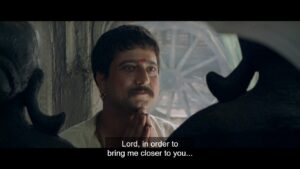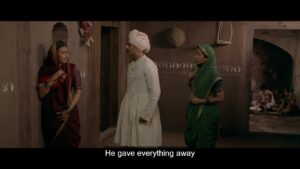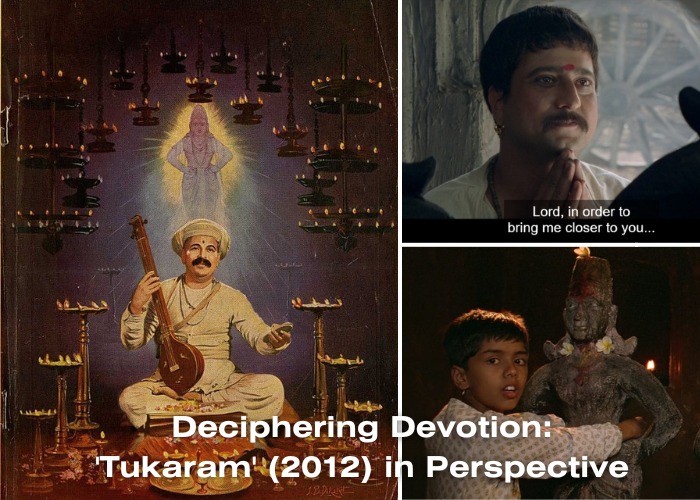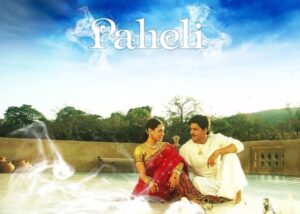-An article by Poojan Patel
“Tukaram” (2012) directed by Chandrakant Kulkarni is a Marathi biopic that delves into the life of Saint Tukaram, a 17th-century Varkari saint, spiritual poet, and ardent devotee of Vitthala. The film not only pays tribute to the legacy of this revered saint but also continues a cinematic tradition that began decades ago.
 The 2012 film “Tukaram,” arriving after 76 years, represents the second cinematic exploration of this profound subject in Marathi cinema. Its release serves as a significant milestone in the enduring legacy of Saint Tukaram’s story, and it allows contemporary audiences to revisit the life and spiritual journey of this revered figure. It’s worth noting that Saint Tukaram’s story has also inspired films in other Indian languages, such as the Kannada film “Santa Thukarama” (1963) and the Telugu film “Bhakta Tukaram” (1973).
The 2012 film “Tukaram,” arriving after 76 years, represents the second cinematic exploration of this profound subject in Marathi cinema. Its release serves as a significant milestone in the enduring legacy of Saint Tukaram’s story, and it allows contemporary audiences to revisit the life and spiritual journey of this revered figure. It’s worth noting that Saint Tukaram’s story has also inspired films in other Indian languages, such as the Kannada film “Santa Thukarama” (1963) and the Telugu film “Bhakta Tukaram” (1973).
Set in the historical context of 17th-century Maharashtra, the film beautifully captures the essence of Sant Tukaram’s life, his deep spiritual quest, and the impact of his devotion on his family and society. As we journey through Tukaram’s life, we witness the complex interplay of faith, sacrifice, and human emotion.
 “Tukaram” excels in using visual language to convey the emotional depth of its characters and the spiritual essence of the story. The cinematography, led by cinematographer Sudhir Palsane, creates breathtaking visuals that mirror the spiritual landscapes of Tukaram’s devotion. The use of natural light, lush landscapes, and traditional Marathi architecture adds a poetic dimension to the storytelling.
“Tukaram” excels in using visual language to convey the emotional depth of its characters and the spiritual essence of the story. The cinematography, led by cinematographer Sudhir Palsane, creates breathtaking visuals that mirror the spiritual landscapes of Tukaram’s devotion. The use of natural light, lush landscapes, and traditional Marathi architecture adds a poetic dimension to the storytelling.
The film portrays Tukaram’s unwavering devotion to Lord Vithoba, the central deity of his worship. Jitendra Joshi delivers a mesmerizing performance as Tukaram, embodying the saint’s spiritual fervor and inner turmoil. Through his portrayal, we are drawn into the soul-stirring world of devotion, where faith becomes a driving force and a source of profound inner transformation.
 The film meticulously recreates the historical setting of 17th-century Maharashtra, paying attention to costume and set design. The attire, jewelry, and traditional clothing worn by the characters reflect the cultural and social milieu of the time.
The film meticulously recreates the historical setting of 17th-century Maharashtra, paying attention to costume and set design. The attire, jewelry, and traditional clothing worn by the characters reflect the cultural and social milieu of the time.
The film subtly addresses the issue of casteism prevalent in society during that period. It shows how Tukaram, as a saint, challenged caste-based discrimination and emphasized devotion to Lord Vithoba as the ultimate path to spiritual realization, transcending caste boundaries.
 One of the notable aspects of the film is its exploration of Tukaram’s philosophical musings. The movie incorporates insights from early 20th-century scholars, such as JF Edwards, who discussed the complexity of Tukaram’s teachings. This adds depth to the narrative, as we observe Tukaram’s oscillation between various philosophical viewpoints, including Dvaita, Advaita, and pantheism. Tukaram’s poetic expressions, or Abhangs, are seamlessly woven into the storytelling, providing a glimpse into his philosophical and spiritual evolution.
One of the notable aspects of the film is its exploration of Tukaram’s philosophical musings. The movie incorporates insights from early 20th-century scholars, such as JF Edwards, who discussed the complexity of Tukaram’s teachings. This adds depth to the narrative, as we observe Tukaram’s oscillation between various philosophical viewpoints, including Dvaita, Advaita, and pantheism. Tukaram’s poetic expressions, or Abhangs, are seamlessly woven into the storytelling, providing a glimpse into his philosophical and spiritual evolution.
 The family dynamics within Tukaram’s household play a pivotal role in the narrative. We witness the emotional challenges faced by his family members, particularly his wives and mother, as they support him (?) on his spiritual journey. The film’s narrative highlights Tukaram’s decision to sell his business, causing emotional turmoil within his family. His wife’s unhappiness stems from financial strain and uncertainty, highlighting the tension between devotion and practicality in his spiritual pursuits. The film portrays the delicate balance between their worldly responsibilities and their devotion to Tukaram, highlighting the sacrifices and inner conflicts that emerge in this context.
The family dynamics within Tukaram’s household play a pivotal role in the narrative. We witness the emotional challenges faced by his family members, particularly his wives and mother, as they support him (?) on his spiritual journey. The film’s narrative highlights Tukaram’s decision to sell his business, causing emotional turmoil within his family. His wife’s unhappiness stems from financial strain and uncertainty, highlighting the tension between devotion and practicality in his spiritual pursuits. The film portrays the delicate balance between their worldly responsibilities and their devotion to Tukaram, highlighting the sacrifices and inner conflicts that emerge in this context.
“Tukaram” is a cinematic gem that transports viewers to a world of profound devotion, philosophical exploration, and the enduring impact of one saint’s life on generations. Jitendra Joshi’s powerful portrayal, coupled with the film’s meticulous attention to historical and philosophical details, makes it a must-watch for those interested in the rich spiritual and cultural heritage of Maharashtra. “Tukaram” is a poignant reminder of the power of faith, the beauty of sacrifice, and the eternal quest for spiritual realization.












